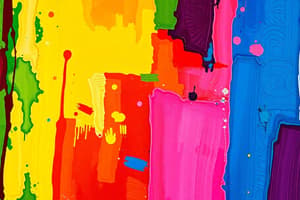Podcast
Questions and Answers
What are tertiary colors?
What are tertiary colors?
- Colors formed by mixing a primary and a secondary color (correct)
- Colors formed by mixing two primary colors
- Colors formed by mixing two secondary colors
- Colors formed by mixing three primary colors
What is the purpose of color harmony?
What is the purpose of color harmony?
- To create a pleasing arrangement of parts (correct)
- To create an under-stimulating visual experience
- To create an overdone, chaotic visual experience
- To create a boring visual experience
What is the result of extreme unity?
What is the result of extreme unity?
- An overdone, chaotic visual experience
- A pleasing arrangement of parts
- An under-stimulating visual experience (correct)
- A boring visual experience
What is the result of extreme complexity?
What is the result of extreme complexity?
What is the most important thing when designing with color?
What is the most important thing when designing with color?
Flashcards are hidden until you start studying
Study Notes
- Primary colors are the three pigment colors that cannot be mixed or formed by any combination of other colors.
- Secondary colors are the colors formed by mixing the primary colors.
- Tertiary colors are the colors formed by mixing a primary and a secondary color.
- Color harmony is a pleasing arrangement of parts, whether it be music, poetry, color, or even an ice cream sundae.
- In visual experiences, harmony is something that is pleasing to the eye.
- When something is not harmonious, it's either boring or chaotic.
- At one extreme is a visual experience that is so bland that the viewer is not engaged. The human brain will reject under-stimulating information. At the other extreme is a visual experience that is so overdone, so chaotic that the viewer can't stand to look at it.
- The human brain rejects what it cannot organize, what it cannot understand.
- Color harmony delivers visual interest and a sense of order.
- In summary, extreme unity leads to under-stimulation, extreme complexity leads to over-stimulation.
- Harmony is a dynamic equilibrium.
- Colors on a color wheel are organized in relation to each other.
- Color schemes can be based on analogous colors (side by side on a 12-part color wheel), complementary colors (directly opposite each other), or natural colors (found in nature).
- When designing with color, it is important to consider the context in which it will be used.
- There are many formulas for creating harmony, but the most important thing is to experiment and find what works best for the particular situation.
- When working with color, it is important to keep in mind the different effects it will have on different backgrounds and elements.
- Colors can be perceived as different colors when viewed from different angles or distances.
- The relationship of values, saturations, and the warmth or coolness of respective hues can cause noticeable differences in our perception of color.
- Colors can be named after their primary colors or after other elements that are associated with them.
- The most common color mistakes are choosing colors that are not appropriate for the environment or the person.
Studying That Suits You
Use AI to generate personalized quizzes and flashcards to suit your learning preferences.



